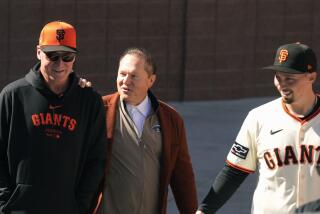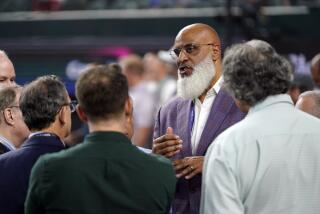ANALYSIS : Agreement Among Club Owners Not as Close as Some May Think
- Share via
With the threat of a work stoppage suddenly diminished, Richard Ravitch said Friday he felt good about the progress baseball club owners made toward a revenue-sharing agreement among the clubs during two long days of meetings in Wisconsin.
Ravitch, president of the owners’ Player Relations Committee, said that at 11 p.m. Thursday night, with many of the owners having checked out of their rooms and facing scrambled travel plans after almost 48 hours of nonstop debate, “all 28 were still there, still talking, still looking for ways to compromise from positions they had told me would remain unchanged when they arrived in Wisconsin.”
Putting a best face on the situation, Ravitch called it a reaffirmation by the owners of their partnership, and said he was confident it would ultimately produce a revenue-sharing agreement contingent on the players’ union agreeing to a salary-cap system of compensation.
He disagreed, however, with Dodger President Peter O’Malley, who said late Thursday night that he was hopeful of a revenue-sharing resolution within 14 or 15 days. Ravitch said it could take several more weeks.
Meanwhile, his positive slant on the meetings seemed open to debate.
Many thought that the failure to reach an agreement merely underscored the deep division between big- and small-market clubs and represented a defeat for Ravitch and his chief ally in the pursuit of a revenue-sharing package: Bud Selig, owner of the Milwaukee Brewers and chairman of the Executive Council.
With 21 votes needed to approve a new economic system, a coalition of 10 high-revenue clubs, including the Dodgers, consistently amended the Ravitch and Selig formulas to a point where any agreement seems likely to be so watered down it will be insignificant to the small-market teams it is designed to help.
Ravitch disagreed. He said Friday that any agreement will be a success.
“The details are unimportant as long as it meets the objective,” he said. “The test is, does it fund the plan we will propose to the union?”
The details, however, are clearly important to the individual clubs, and Ravitch said he could respect that. He said it was appropriate for the big- and small-market clubs to meet in groups and discuss joint interests and concerns.
An official with the players’ union--on the outside looking in, as usual--saw it another way, saying Friday that the divisions are characteristic of the disunity and self-interest that plagues the owners when they confront another round of collective negotiations.
The owners voted in December to reopen talks a year early but still have not made a proposal to the union, which has been considering a September strike because of the owners’ failure to negotiate and a fear that the owners would either stage a lockout next spring or unilaterally impose their new system when the current agreement expires on Dec. 31.
Ravitch pledged Thursday night that the owners would not attempt to impose a new system or impose a lockout at the start of the 1994 season. Friday, he made it stronger, saying there would be no lockout in ‘94, period.
He denied that this stemmed from the owners’ tenuous position after failing to reach a revenue-sharing agreement, thereby further delaying negotiations with the union. He said the owners agreed to the no-lockout pledge and assurance that they would not unilaterally create a new system during a meeting in Denver two months ago.
“The fans ought to know that they’ll have an opening day,” he said of ’94. “I also don’t want to create an artificial deadline on an agreement with the union. I’ll leave the threats to (union Executive Director) Don Fehr. He seems to enjoy it. It’s never been part of my strategy.”
Fehr could not be reached for comment Friday. Union officials said they would have nothing to say on the Ravitch pledge and the possibility of a no-strike pledge by the union until they heard from Ravitch directly.
However, a union lawyer acknowledged that the “possibility of a (September) players’ strike would be considerably diminished” if Ravitch puts his pledge in the form of a binding agreement.
Said Ravitch: “I never took Don seriously anyway. I never thought he’d strike and deprive his players of this signing season (which could be the last under the current system).”
More to Read
Are you a true-blue fan?
Get our Dodgers Dugout newsletter for insights, news and much more.
You may occasionally receive promotional content from the Los Angeles Times.







